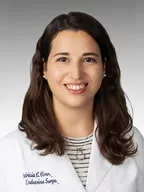Patricia Conroy

| Why Was I interested in this T32? |
As a surgical resident and aspiring endocrine surgeon, I am involved in many aspects of a patient’s cancer care, from diagnosis, to treatment, to surveillance. My T32 research proposal was designed based on the idea that the same collaborative, diverse approach to clinical cancer care is needed in surgical oncology research. The T32 allowed me to craft a training plan comprised of complementary research questions that together have the potential to improve patient care in a variety of settings. The translational, health services research, and regulatory sciences projects were developed with the help of my mentors to provide me with the skills necessary for a career as an independent researcher.
|
| What did I work on in my T32 research project? |
The overarching theme of my T32 research was examining strategies for minimizing the burden of unnecessary surgery in cancer care. My translational research project (mentor: Kimberly Kirkwood, MD) aimed to identify markers in pre-malignant pancreatic cysts that can be used for risk stratification for progression to pancreatic adenocarcinoma, thus sparing patients with indolent disease from unnecessary surgery. We used our banked repository of 81 pancreatic cyst fluid samples to investigate if two small-volume biomarkers, glucose and the protease gastricsin, were non-inferior to CEA for pancreatic cystic lesion classification. Gastricsin activity was measured using an internally-quenched fluorescent substrate. Glucose levels were measured with a standard glucometer. CEA levels were obtained from the medical record. Models using established cutoffs and Classification and Regression Trees were created to predict mucinous status. Model performance was evaluated using nested cross-validation. We found that gastricsin and glucose performed similarly to CEA and required <5% of the volume required for CEA. This work was presented at the 2022 Academic Surgical Congress Basic Science Plenary (top 1% of abstracts submitted) in February 2022. The manuscript is currently under review by the Journal of Surgical Research. In parallel, my health services research project (mentor: Julie Ann Sosa, MD, MA) aimed to determine whether practice patterns among endocrine surgeons have changed since publication of the revised 2015 American Thyroid Association (ATA) guidelines which de-escalated treatment recommendations for low-risk differentiated thyroid cancer (DTC). We leveraged the Collaborative Endocrine Surgery Quality Improvement Program (CESQIP) database to 1) compare outcomes after thyroid lobectomy and total thyroidectomy for low-risk DTC and 2) examine trends in extent of surgery performed by endocrine surgeons since the revised 2015 ATA guidelines. We found that thyroid lobectomy for low-risk DTC was associated with better short-term outcomes compared to total thyroidectomy. Additionally, we found that the proportion of thyroid lobectomies performed for low-risk DTC has increased since 2015. This work was accepted for presentation at the American Association of Endocrine Surgeons (AAES) 2022 Annual Meeting in May 2022 and was awarded an honorable mention for clinical research at the 2022 UCSF Department of Surgery Research Symposium. The manuscript is currently under review by Surgery. |
| Important lessons I learned from the T32 program and the I2I Leadership course |
Through my T32 fellowship, the most important lessons I learned were how to design and conduct a feasible research study. Early in my research planning, I had broad questions that, in retrospect, were interesting but not feasible. Working with my mentors over the past two years I have now designed, conducted, presented, and written up several studies. In parallel, the Idea to Impact (I2I) leadership curriculum taught me how to leverage available resources and seek out collaborators in order to move my ideas and research projects forward. Adaptive leadership was a novel concept that I will continue to apply throughout my career. Because of my T32 training, I now feel confident in effectively approaching a research question and building the team needed to accomplish my goals.
|
